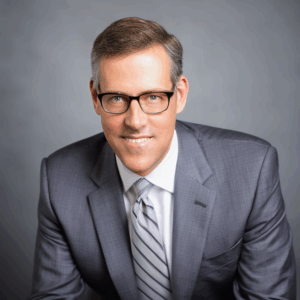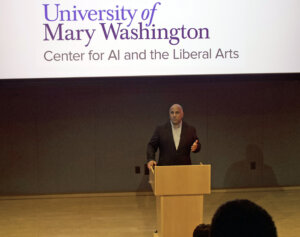
As artificial intelligence reshapes everything from classrooms to careers, the University of Mary Washington is bringing that dialogue to campus. UMW’s new Center for AI and the Liberal Arts will host a public lecture exploring the ubiquitous technology’s role in education, helping students, educators and community members navigate the change.
The talk, titled Reclaiming Human Intelligence in the Age of AI: Plural Futures for Education and Society, will be given by Alan Coverstone, an educator, leader and consultant with more than 30 years of experience in K-12 and higher education. It will be held on Wednesday, Oct. 29, at 7 p.m., at the Cedric Rucker University Center in the Chandler Ballroom. A reception will follow.
Drawing from his experience with how people learn, how AI works and how education can serve everyone, Coverstone – also a communication and digital studies adjunct instructor at UMW – will challenge the limited, algorithm-like view of human intelligence that influences education and public policy today. His framework of AI pluralism calls for embracing diverse human capacities – creative, ethical, emotional and analytical – and reimagines schools and universities as sites of empowerment rather than standardization.
“Dr. Coverstone’s version of AI pluralism aligns beautifully with Mary Washington’s liberal arts mission,” said Professor of Communication and Digital Studies Anand Rao, who is director of the Center for AI and the Liberal Arts. “He reminds us that intelligence takes many forms, and that education must nurture all of them. His work underscores the mission of our center, which is to prepare students to think critically, question technology and lead ethically in a digital age.”

Launched this fall, UMW’s Center for AI and the Liberal Arts serves as a hub for teaching, research and community dialogue about artificial intelligence. It brings together Mary Washington faculty and students from across disciplines to explore AI’s applications and implications through a liberal arts lens.
“We’re not just preparing students for the classroom, we’re preparing them for the world beyond it,” Rao said. “That means understanding what AI means for the workforce, education and our daily lives.”
The creation of the center was aided by a $100,000 gift, over five years, from Steve Gladis and his wife, Donna Sheehan Gladis ’68, a UMW alumna and Foundation Board member. Their support aims to expand opportunities for students and faculty to engage with emerging technologies through an ethical, human-centered approach.
“We’ve seen firsthand how quickly AI technology is changing the world, and how important it is for students to be prepared,” the Gladises said in a joint statement when the center was launched. “Our hope is that UMW graduates will pair creativity and critical thinking with AI skills to thrive, compete and lead in whatever future they choose.”
In its first semester, the center has already begun offering programs that put its vision in action. In September, it hosted a public debate, titled AI and the Environment, featuring visiting Assistant Professor of Communication and Digital Studies Kaitlyn Haynal and Senior Lecturer Mike Reno from the Department of Cultural and Philosophical Inquiry. Their lively exchange explored whether AI can help or harm efforts to protect the planet.
More events are planned this fall, including a Nov. 18 debate on AI and Copyright in Seacobeck Hall’s Weatherly Wing. Upcoming discussions are planned on themes such as AI and creative expression, ethics in algorithmic decision-making, AI’s impact on labor and work, and the future of human-AI collaboration.
Learn more or view upcoming events on the Center for AI and the Liberal Arts website.
Leave a Reply